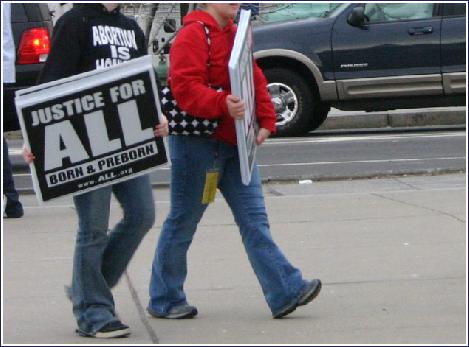The Political Future of the
Pro-Life Movement
|
By Deal Hudson
|

|
|
Five-hundred people were turned away from the "Pro-Life Summit to End Abortion"
held by Dr. Monica M. Miller this past weekend in Ann Arbor, MI. Most of the 500
who did have tickets made it to Christ the King Church in spite of the ten
inches of snow that started falling Saturday morning.
|
|
It's been quite a while since I've seen any group of Catholics as energized as
those gathered by Miller's apostolate, Citizens for a Pro- Life Society. Anyone
who had predicted the withdrawal of pro-life Catholics from political engagement
after Barack Obama's victory would have been stunned by what they saw and heard
at Christ the King.
|
|
Ovation after ovation greeted speakers who called for
all-out resistance to President-elect Barack Obama's stated plan to provide
federal funding for domestic and international abortions while reducing all
restrictions on the procedure. The warmest greeting was given to Bishop Earl
Boyea, the new bishop of Lansing, whose speech was pointed and incisive while
asking that pro-life activism always be carried out with love that can "win the
heart."
|
|
A surprising level of consensus emerged from the speakers, which
included Fr. Frank Pavone, Prof. Janet Smith, the legendary Joe Schiedler, Ed
Rivet of Michigan Right to Life, and radio talk-show host Al Kresta, who made
sure the entire conference was broadcast live over Ave Maria Radio. Everyone --
myself included -- emphasized the fact that preparations for the elections in
2010 and 2012 need to be underway already.
|
|
We also agreed that there was much to
learn from the success of Obama's Catholic outreach effort in 2008: It was
well-planned far in advance, well-executed, and did not lack for funding. If
pro-life Catholics want to respond successfully over the next four years, they
must undertake a similar level of national coalition-building that can influence
chanceries and parish communities.
|
|
I admitted to the conference that the 2008
election had changed my mind about the role of clergy in a Catholic political
strategy. In both 2000 and 2004, I helped implement an overall effort that was
centered on Mass-attending laity -- one that did not actively seek to enlist
friendly priests and bishops. That strategy worked in those elections to win the
Catholic vote, but was countered in 2008 by Catholic Obama supporters who were
able to get their message inside parishes through study groups and seminars.
|
|
Obama's Catholic outreach made skillful use of faux "non-partisan" organizations
(like Catholics in Alliance for the Common Good) to promulgate an interpretation
of "Faithful Citizenship" that offered the undecided two theological loopholes.
Their basic message was that Catholics may cast their ballots for Obama if, 1)
They are not using their vote to show support for his abortion policy, or 2) If
there are other "morally grave" issues that offset abortion.
|
|
Several speakers at
the summit stressed the need to create a parish- level effort to correct the
misinterpretation of "Faithful Citizenship," which so many bishops tried to do
in the final weeks of the campaign. There is no way to conduct such a campaign
without the support of our priests and bishops -- that's why their inclusion in
a national pro- life strategy is essential.
|
|
Does that mean bishops and priests
are going to be recruited in a GOP effort? Absolutely not. As every speaker at
the conference -- myself included -- emphasized, our pro-life political strategy
belongs to the Church, not to any political party. It should be implemented with
the intention to encourage and support pro-life candidates in both parties.
|
|
Along with these consensus points on political strategy, there was a general
optimism about the way American culture was gradually being won over to the
pro-life point of view.
|
|
For example, at the upcoming March for Life on January
22, there will be a group of former abortion doctors standing on the steps of
the Supreme Court to tell the world about their regrets for performing
abortions.
|
|
Father Pavone made the point this way:
|
|
"When have you ever heard of a group of doctors who did not perform abortions
gather to say they regretted not performing them? All those who support it,
because of the nature of what it is, eventually abhor abortion." |
|
|
|
|
Everyone in the room needed this reminder that
culture and politics are
different -- and of the two, culture is by far the more important.
|
|
|
|
Deal W. Hudson is the director of InsideCatholic.com and the author of
Onward, Christian Soldiers: The Growing Political Power of Catholics and
Evangelicals in the United States (Simon and Schuster). |
|
|
|
|